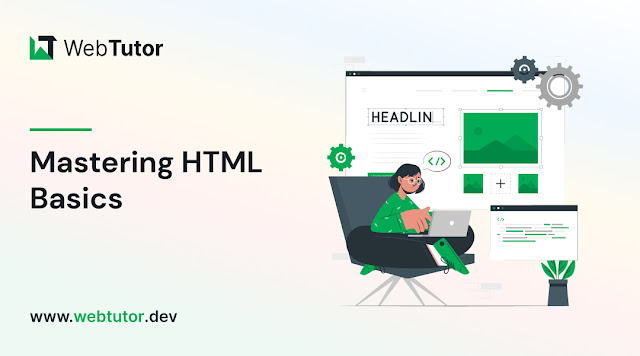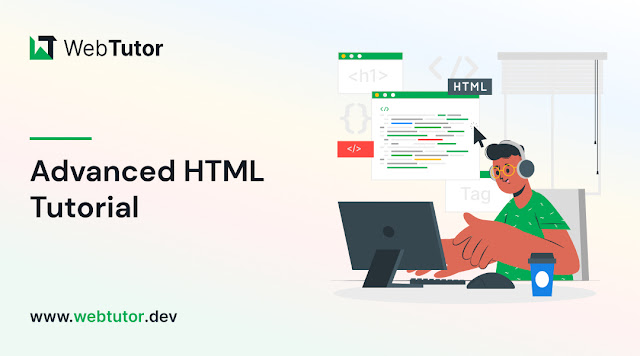Mastering HTML Basics: A Comprehensive Guide with WebTutor.dev
As the foundation of web development, HTML (Hypertext Markup Language) is a crucial language for anyone looking to create websites or web applications. Whether you are a beginner just starting out or an experienced developer looking to brush up on your skills, WebTutor.dev offers an exceptional resource for mastering HTML basics. In this blog post, we will delve into the wealth of knowledge available at https://webtutor.dev/html/html-basic, and explore how this comprehensive guide can help you level up your HTML skills.
Structured Learning for
Beginners
If you are new to web development and HTML, WebTutor.dev
HTML Basics guide is an excellent starting point. The guide is structured in a
way that is easy to follow, with concepts introduced in a logical order that
builds upon each other. From understanding the basic structure of an HTML
document to working with various HTML elements, HTML attributes, and HTML tags, the guide
covers all the essentials in a beginner-friendly manner.
One of the strengths of the guide is its practical approach to learning. Each concept is accompanied by clear explanations, examples, and demonstrations of how to implement it in real-world scenarios. This hands-on approach allows beginners to apply what they have learned and see the results in their web pages, which helps solidify their understanding of HTML concepts.
Comprehensive Coverage of
HTML Basics
The HTML Basics guide on WebTutor.dev covers a wide range of
topics, providing a comprehensive overview of HTML fundamentals. Some of the
key topics covered in the guide include:
HTML Document Structure: Understanding the basic structure of an HTML
document, including the <!DOCTYPE>, <html>, <head>,
and <body> elements.
HTML Elements: Learning about different HTML elements
such as headings, paragraphs, links, images, lists, tables, forms, and more,
and how to use them correctly.
HTML Attributes: Understanding HTML attributes
and how to use them to customize the behavior and appearance of HTML elements.
HTML Tags: Exploring various HTML tags and their
proper usage, including opening and closing tags, nested tags, and void tags.
HTML Forms: Understanding how to create forms in HTML
to collect user input, including different form elements such as text inputs,
checkboxes, radio buttons, and dropdown menus.
HTML Semantics: Learning about the semantic elements
in HTML, such as <header>, <nav>, <main>, <article>,
<aside>, and <footer>, and how they contribute to building
accessible and SEO-friendly websites.
HTML Validation: Understanding the importance of HTML
validation and how to validate HTML documents using online tools.
In addition to these topics, the guide also covers other
essential HTML concepts such as doctypes, character encoding, linking to
external resources, and best practices for writing clean and maintainable HTML
code.
Interactive Learning
Experience
WebTutor.dev offers an
interactive learning experience with its HTML Basics guide. The guide includes
numerous examples and exercises that allow learners to practice what they've
learned in a hands-on manner. Learners can experiment with the code examples
provided in the guide, make modifications, and see the results in real-time.
This interactive approach helps reinforce the concepts and allows learners to
gain confidence in their HTML skills.
Moreover, WebTutor.dev provides a code playground where
learners can write HTML code, view the output, and experiment with different
HTML concepts in a safe environment. This interactive feature allows learners
to practice coding without the need for any additional tools or software,
making it a convenient and user-friendly learning experience.
Up-to-Date and Accessible
Learning Material
WebTutor.dev HTML Basics guide is regularly updated to
ensure that it reflects the latest best practices and standards in HTML
development. This means that learners can trust the content to be current and
relevant to the latest web development
trends. The guide is also designed to be accessible, with clear
explanations, examples, and demonstrations that cater to different learning
styles. Whether you're a visual learner who prefers diagrams and illustrations
or a hands-on learner who wants to experiment with code, WebTutor.dev HTML Basics guide provides
a variety of learning materials to accommodate different learning preferences.
Community Support and
Resources
WebTutor.dev goes beyond just providing a comprehensive
guide to HTML basics. The website also offers a supportive community where
learners can connect with other web developers, ask questions, and seek help
when needed. This community aspect adds an extra layer of support to the
learning experience, as learners can learn from each other's experiences,
collaborate on projects, and grow together as developers.
In addition to the community support, WebTutor.dev also provides
additional resources such as cheat sheets, reference guides, and tutorials on
related web development technologies, which can complement the HTML Basics
guide and further enhance the learning journey.
Conclusion
Mastering HTML basics is essential for anyone interested in
web development, and WebTutor.dev HTML Basics guide is a valuable resource for
achieving that goal. With its structured learning approach, comprehensive
coverage of HTML fundamentals, interactive learning experience, up-to-date and
accessible materials, and community support, WebTutor.dev offers a robust and
effective platform for
learning HTML.
Whether you are a beginner just starting out or an
experienced developer looking to refresh your HTML skills, WebTutor.dev HTML
Basics guide is a valuable tool that can help you strengthen your foundation in
HTML and set you on the path to becoming a proficient web developer. So, head
over to https://webtutor.dev/html/html-basic,
dive into the guide, and unlock the power of HTML for your web development
projects. Happy coding!



Comments
Post a Comment